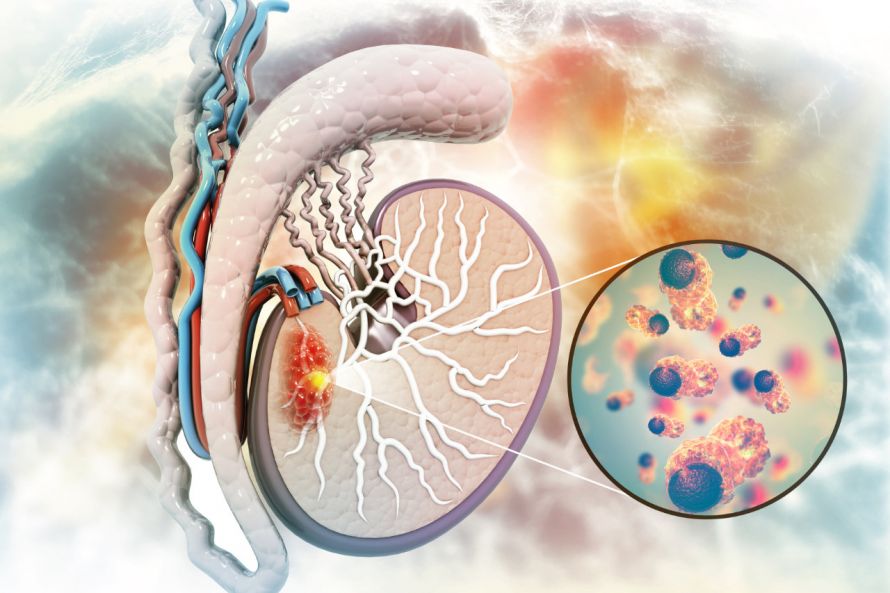Testicular cancer is a malignant tumour disease. It develops in one of the testis and can spread to the vas deferens and epididymis as it progresses.
Testicular cancer is the most common cancer in young men, but is curable in the majority of patients. Testicular cancer accounts for only about 1.6 percent of all new cancer cases and is therefore comparatively rare.
Testicular cancer can manifest itself through various symptoms, such as:
- palpable induration (hardness)
- Feeling of heaviness and increase in size
- Pain
Palpable induration (hardness)
Hardening inside the scrotum is one of the most common symptoms of testicular cancer. In this case, the surface of the testicle feels bumpy or knotty.
Feeling of heaviness and increase in size
If one of the testicles becomes enlarged, this can be a sign of testicular cancer. This is true for about 70 percent of people diagnosed with testicular cancer.
Such an increase in size can be explained either by tumour growth or an accumulation of fluid. Due to the increase in size, patients describe that the affected testicle feels heavy.
Pain
Pain occurs in only ten to 15 percent of testicular cancer patients. Pain in the testicles is therefore rarely the first sign of testicular cancer.
If pain occurs, it may be due to the growing testicular tumour. But bleeding in the cancer tissue can also lead to pressing or stabbing pain.

Cross-section through a testicle showing tumour growth © Crystal light | AdobeStock
As yet, medicine has not been able to definitively clarify the causes of testicular cancer.
However, there is a connection between testicular cancer and undescended testicles. Men who are diagnosed with undescended testicles or who had them in childhood seem to develop testicular cancer more often.
There is no specific method to detect testicular cancer. For this reason, it is important that men regularly check their scrotum for changes. If there is pain in one or both testicles, the patient should consult a doctor.
The urologist examines the testicles and clarifies possible risk factors with the patient. This is followed by an ultrasound examination of the testis and the abdominal organs. With the help of this examination, the doctor can visualise a possible tumour.
The diagnosis of testicular cancer can ultimately only be ruled out or confirmed with a tissue sample. In this case, the doctor will remove testicular tissue during a minor surgical procedure and send it to the laboratory for examination.
In advanced stages, metastases (secondary tumours) can occur in distant organs. Then additional imaging procedures, such as MRI or CT are necessary. The doctors use this to find out exactly where metastases have formed. These also need to be treated.
As a rule, the treatment of testicular cancer begins with an operation on the affected testicle. The stage of the disease then determines the further treatment.
First, the surgeon removes the entire testicle (radical orchiectomy) to be able to remove malignant tissue.
It depends on the type of testicular tumour as well as the progression of the cancer which treatment options follow the operation.
Treatment in the initial stage
If testicular cancer has been detected at an early stage of the tumour, the operation itself is usually sufficient. However, the patient should keep regular follow-up appointments with the doctor so that a possible relapse can be detected in time.
Despite modern examination and surgical procedures, micro-metastases (very small secondary tumours) can be overlooked. However, this happens very rarely. For this reason, even in the case of early-stage testicular cancer, possible radiation or chemotherapy should be considered after the surgical operation.
Treatment at the advanced stage
If the cancer has already spread, radiotherapy is obligatory following the operation.
If distant metastases have already formed or if the lymph node involvement is pronounced, chemotherapy is unavoidable.
Cure for testicular cancer
The progression of treated testicular cancer is favourable in most cases, especially if it is detected in time. No other cancer has a better prognosis than testicular cancer. A permanent cure is almost always achieved if the malignant testicular tumour is confined to the testicle.
Even if metastases have already formed, there are good chances of a cure for testicular cancer. A clear majority of those affected recover completely and can lead a normal life.
However, in advanced stages, testicular cancer may require more drastic treatment. Some side effects may occur. These include
- disturbed ejaculation and
- reduced sperm production.
This can lead to male infertility. However, affected men do not have to fear inadequate potency and thus permanently impaired sexuality.
Testicular cancer cannot be prevented. According to previous findings, environmental factors and lifestyle do not play a role in the development of malignant testicular tumours. Since testicular cancer can be treated particularly well if diagnosed early, early detection is very important.
It is recommended for men to palpate their testicles regularly. Doctors recommend that men between the ages of 15 and 45 should carry out a self-check once a month. This is especially important for men who suffer from undescended testicles or have a family history of undescended testicles. They have an increased risk of testicular cancer.
Self-examination of the testicles is a good idea when taking a bath or shower, for example. The water softens the skin of the scrotum and makes it easier to feel.
Assume a relaxed posture for the examination and palpate your testicles:
- Take the testicles in both palms and move them back and forth between your thumb and fingers with gentle pressure.
- Look out for possible swellings or lumps.
- Also examine your testicles externally for possible changes, such as swelling.
- Compare the weight and size of the two testicles with each other. In most cases, one of the testicles is larger than the other, but this is perfectly normal and not a cause for concern. If you compare the testicles regularly, it will be easier for you to detect changes in the size of a testicle.
Testicular cancer is a comparatively rare cancer that mainly affects younger men.
There is no specific prevention against testicular cancer. The causes for the occurrence of testicular cancer have not yet been definitively clarified in medicine.
The treatment for testicular cancer is always surgery and removal of the affected testicle. In principle, the chances of curing testicular cancer are good to very good – even in advanced stages of the disease.













